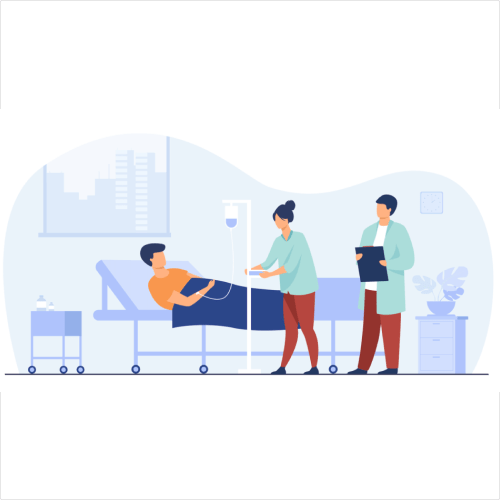How do you start preparing for residency interviews?
We know residency interviews can be stressful, particularly considering that you are making a commitment to a program and location that you will be spending a minimum of the next three years at (for some, this can be 6 or 7 years). Below is a list of the most common interview questions that are posed by interviewers, and examples of how you can answer them in a way that is safe and effective while giving the best first impression possible.
1. “Tell me a little bit about yourself”
This is almost always the first question in many interviews. Have a 1-2 minute answer that discusses where you come from and includes a few hobbies. Avoid overly long answers that go into detail about your work experiences, qualifications, etc. The reason for this is that they will absolutely get to your qualifications at some point during the interview, and this question is more geared toward simply getting to know a little bit about you as a person (likes/dislikes, hobbies, and how you otherwise spend your time). Jumping straight into a prepared answer regarding your qualifications can not only seem over-eager, but actually be off-putting to many interviewers as it strays away from the question asked.
2. “What are your hobbies/what do you like to do in your spare time?”

Discuss the active things you do with your day such as sports, exercise, social events, music or instruments, and so forth. Avoid only discussing activities where you are staying at home and watching Netflix (i.e. doing something that is not active or social). Remember, they are looking for people who will be active and social members of the program to build culture at that institution.
3. “What do you feel are your greatest strengths as an applicant?”
The common response to this is to start listing off a number of traits, which is a pitfall that you should avoid. The best answers usually include a story that exhibits those traits that you are aiming to display. For instance, you can discuss a volunteer experience in which you coordinated and led multiple groups to achieve a goal that you were passionate about. This demonstrates your abilities as a leader and collaborator, and shows your passion for that topic, all without explicitly saying the words ‘passionate, leader, and collaborator”. The story allows the interviewer to come to this conclusion themselves, and is more memorable, which is a powerful tool to use for many answers on interview day.
4. “What do you hope to gain from our residency program?”

Generally, you should include clinical training first and foremost, research opportunities, community involvement at that institution, and a positive environment to learn and grow. If you are able to site specific research labs or community programs that the institution you are interviewing with has, that will be an extra bonus as it shows you have already done your research.
So, how important is the interview to schools? It turns out, it’s very important. In a survey of over 1,000 residency programs in the United States, the interview was ranked as the second most important factor when deciding on ranking for the match, just after interpersonal skills.If you want to prepare well for an interview, get expert help and check out our medicine interview preparation services.
5. “Tell me something about you that is not on your C.V. or resume”
There are many ways to answer this question well. If you choose a professional story, make sure it is not one you have already written about that they may have read. Outside of work, you can choose a hobby that is interesting but also demonstrates discipline and dedication (triathlon running, playing the piano, and so forth).
6. “What do you do to cope with stress?”

Reasonable answers to this question include different forms of exercise, reading, and spending time with friends or family. Programs are looking for someone who has experience handling stress and knows how to deal with this in a healthy manner that will not interfere with work or the success of the program.
7. “If you weren’t able to do medicine at all as a career, what field would you choose and why?”
There are several options to choose from. For instance, it would be completely reasonable to choose teaching due to a love of working with others and spreading knowledge, or engineering if you enjoy coding and using R for statistics software, or going into a research field that you have already demonstrated an interest in by publishing in that area, or working for a non-profit toward a cause that you are passionate about. Remember to center on the qualities that programs are looking for when considering applicants, and highlight as least one of these traits while tying in previous work that you have done which substantiates your history of dedication to that goal.
8 "What is a patient encounter that truly impacted you?”

Pick something from the heart that has truly stayed with you (we all have that patient case, if not multiple). A great example can be a patient that had repeated hospital admissions due to lack of access to care, where you worked with pharmacy and social work teams as well as family to improve transportation for outpatient appointments and access to medications. This could have made an impact on you because you observed how a team made of different staff members with expertise can work well to improve patient care in the long term. This is only one example, however other examples that demonstrate your ability to work with others, and caring for patients, are helpful to utilize when discussing a patient encounter that was meaningful to you.
Frequently asked questions
Since medical schools can receive thousands of applications for very few spots, and many of these applicants all have average or above average GPA and MCAT scores, the personal statement can become and important differentiator.
Absolutely. You should have multiple people review your essays for grammar and spelling errors, transition quality, and overall message. The most polished essays that are application-ready have usually been through at least 2 or 3 revisions prior to submission.
The most common format for residency interviews is one-on-one or panel interviews (two or more interviewers with one applicant). MMI interviews are being employed more in medical school interviews, though it is still possible to encounter this in a few residency programs.
During interview season, you may have many interviews and it will be difficult to remember everything that occurred during each day and your impressions when comparing programs prior to ranking for the match. For this reason, you should take a few minutes to write down your impressions directly after interview day for each program.
Anywhere between 1.5 to 3 minutes is a safe range for answers, although a few seconds more or less than this is completely reasonable depending on the question. The quality of the answer, given concisely and directly, is far more important than the amount of minutes you are speaking. That being said, avoid rambling for overly long periods of time.
Thank you letters may not make a difference in ranking at a program, however they are a thoughtful and nice touch. The exception to this is if a program specifically states not to send thank you’s – then you should respect their request. For letters of intent, it is appropriate to choose one program if it is your clear number one choice and send an email to the program director letting them know. Do not choose more than one program to send this letter to – it is first and foremost dishonest to do so, and medicine is a small world and it is not advisable to burn bridges.
